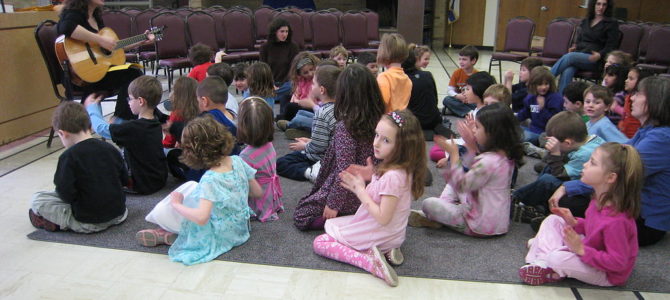
Carlo Maria Viganò, the former lead diplomat from the Vatican to the USA, released a letter saying Pope Francis not only knew of the widespread sexual abuse by Catholic clergy but also helped cover it up. Religious people are once again left reeling, wondering how the church could contain such evil, over and over and over again.
The wrongs of the past can’t be retroactively undone, of course, but houses of worship can implement realistic policies to help keep kids safe and minimize the risks of mass events like this in the future.
It’s terrible to think of church being an unsafe place for anyone, especially the most vulnerable among us. This has led many people to be reluctant to address safety in the church, instead hoping that nothing like that will ever happen in theirs.
But Kim Schave, the executive director of Humanitri, explains this viewpoint is part of the problem: “Abusers have indicated that the church is an easy target because Christians are easily fooled—they want to believe in the inherent good of fellow believers. Abusers have mastered the art of manipulation and are able to mask their ill intentions by posing as upstanding church-goers. They can even ascend to leadership positions within the church.”
Unfolding discussions in the wake of this latest sex scandal show a fundamental need for providing clear policies for safe church practices. Parents can reach out to their church leadership and let them know that they want to help start putting procedures like the following suggestions in place, and so can other concerned adults.
The church should operate as a family, with all members working together with safety as a common goal. Here are some policy suggestions to consider implementing at your house of worship.
1. Transparency Between Parents and Kids
Hiding things in the shadows allows inappropriate behavior to survive. It’s important for families and churches to talk about what is acceptable, and what isn’t.
This should be handled in the home between parents and children, with parents talking to children in age-appropriate terms about their bodies and making it clear that other people should not ask them to keep secrets from their parents, or to touch or see their bodies.
Don’t rely on stranger danger to protect kids, because reports reveal that more than 90 percent of abuse cases are by someone the child already knows and has a trusted relationship with. It’s not necessary to be scary or tell kids things they aren’t ready to hear, but it is important to let your children know that if someone makes them feel uncomfortable you’ll always be willing to listen.
2. A ‘Two-Deep’ Policy
One of the quickest things to shift for children’s programming in churches is the idea that all classes should have at least two adults teaching or leading them. Don’t have a single adult supervising children. This isn’t just for the children, it’s also to protect the adults from accusations of evil. Many insurance companies are now suggesting policies like this and may offer risk management credits for premiums.
3. No One-On-One With Kids
This might seem redundant with the previous suggestion, but it can’t be overstated. Don’t put people in situations where they’re alone at church or on church trips with children who aren’t their own kids. Don’t have a youth group leader drive a single child home at night, and make sure that you’re extending the policies for children up to teenagers as well.
4. Lacking Celibate Clergy Doesn’t Protect You
There’s a misconception in some circles that sexual abuse in the church is limited to the Catholic church, and that it’s caused by celibate clergy. This isn’t the truth.
While some of the largest and most well-publicized settlements have been levied against the Roman Catholic Church, multi-million-dollar judgments have also been made against Lutheran churches and other denominations, as well. Abuse happens in large churches and in small, personal house churches.
It’s dangerous to think that some churches are immune, or that abuse like this is limited to only certain church bodies. Remember: If you think it can’t happen to your church, it’s more likely to because you’ve put your blinders on.
5. Look For Close Friends, Not Random Kidnappers
As mentioned already, most often abusers are people children know and trust, not random strangers. It’s terrifying to think that it’s the people around kids most likely to hurt them, but ignoring this and fearing public bathrooms and chance abductions don’t match the reality of how most predators meet their victims.
Shanna Wright, a social worker who works with sexual offenders and is a secondary survivor of sexual assault, notes that, “sex offenders are good at grooming and gaslighting. Grooming meaning they prepare the path to sexually assault so that the odds that the victim will be compliant increases and the risk of being caught decreases. Gaslighting is similar….sexually assaulting is a mind game more than a physical one.”
She also highlights abusers’ personal connections, and the low rate of offenders who serve prison time for their actions: “You are most likely to be sexually assaulted by someone you know. Stranger danger is a myth. Also, sexual offending is a great gig because the likelihood you will ever be held accountable legally is slim.”
According to a report released by the Bureau of Justice Statistics by the U.S. Justice Department, only 29 percent of cases where the victim is a juvenile will result in an arrest.
6. Background Checks Won’t Catch Lots of Abusers
Your church might already have a background check policy in place for all people with contact with minors. This is a good policy, and shouldn’t be discontinued. It’s not a fail-safe, though, and can’t be a stand-alone.
Background checks only catch people who have been arrested, and it may take years of offending behavior to be caught, if ever. Background checks also come with flaws, like information that isn’t transferred to the National Instant Criminal Background Check System.
7. Have a Screening Process
Take time with all staff and church volunteers to talk about how they would handle uncovering an abusive situation. Ask them what they’d do. What would their first steps be, and are they aware of the proper ways to make sure that everyone involved receives help?
The church should have a clear and easy to follow policy for this. Reach out to your insurance company for help drafting one if you don’t already have one, or ask your local child protective officer if he or she has a sample policy. Part of this is not only knowing how to handle the situation if something unthinkable ever happens, but there’s also the preventative nature of letting potential abusers know that this is a proactive environment.
Church bodies don’t need to be reactive about abuse, and can instead shift into a proactive mode where steps are taken to minimize the opportunities for misconduct within their walls. Churches should be a place of refuge and safety, especially for the most vulnerable, like children. None of these steps are complicated or expensive, and can yield immediate benefits for everyone in a faith community.









